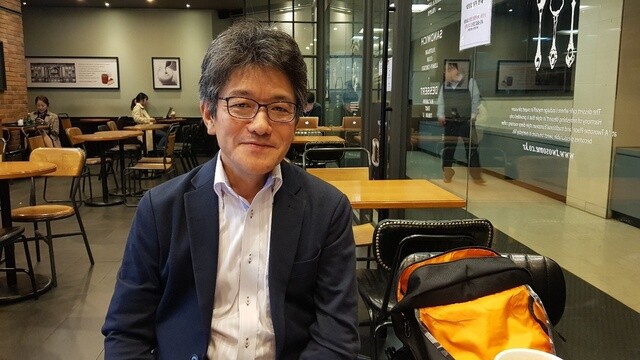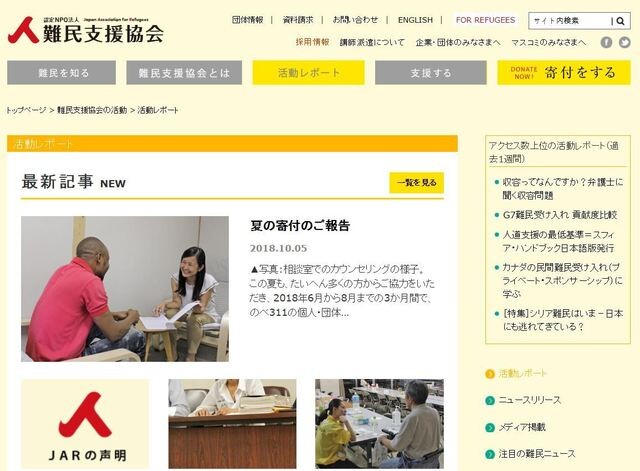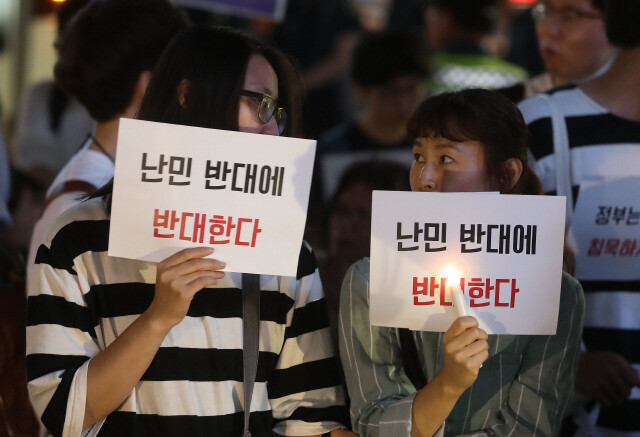hankyoreh
Links to other country sites 다른 나라 사이트 링크
[Interview] S. Korea’s refugee situation and its influence on Japan

On Oct. 17, the South Korean government decided to grant humanitarian sojourn permits to a group of 339 Yemenis who had come to Jeju Island and applied for refugee status. Not a single member of the group was recognized as a refugee. Just two days later, on Oct. 19, the Seoul immigration office granted refugee status to an Iranian middle school student who had applied for refugee status because of religious persecution.
Just as in the numerous countries of Europe that have faced various kinds of political and social conflict over the issue of accepting refugees, the refugee issue has now forced its way into South Koreans’ daily life.
The same can be said about Japan, another Northeast Asian country and South Korea’s neighbor. The Japanese have been watching closely to see whether Seoul would grant refugee status to the Yemenis on Jeju Island. That’s why the Hankyoreh met Hiroaki Ishii, the acting director of the Japan Association for Refugees (JAR), at a cafe in Seoul on the afternoon of Oct. 16 while Ishii was visiting South Korea on a business trip.
JAR is the largest civic group in Japan that provides aid to refugees. “Accepting refugees is an international issue that no country will be able to avoid in the future. We plan to keep reaching out to several South Korean civic groups in Japan, given our similar legal systems for refugees,” Ishii said.

Ishii co-founded JAR in 1999. He’d joined Amnesty International in 1995 and during the four intervening years felt a keen need for an NGO that would take responsibility for the refugee issue. “Amnesty International was like the department store of NGOs, since it deals with nearly every human rights issue. Its programs for helping refugees were generally limited to providing legal support for applying for refugee status. But refugees are people who have been robbed of nearly all their basic rights. What they need is not only legal assistance but also support for basic rights such as a livelihood and medical care,” he said.
Established by ten like-minded activists, JAR has grown over the past two decades into a relatively large NGO, currently staffed by 30 full-time workers. The only government assistance provided to refugees is for their medical expenses, so most of JAR’s aid programs help refugees find a home and adjust to local conditions.
When it comes to the refugee issue, conditions in Japan are much harsher than in South Korea. The only OECD member states that have a lower refugee acceptance rate than South Korea (4.1 percent) are Japan and Israel. According to figures provided by Japan’s Justice Ministry in Feb. 2018, Japan only granted refugee status to 20 of the total 19,623 applicants in 2017 – a refugee acceptance rate of 0.2 percent.
“As the 2020 Tokyo Olympics approach, it has actually become easier to get a work or student visa. But the refugee acceptance rate remains much lower than international standards. JAR has been advocating legislation for refugees for 15 years now, but we have yet to get anywhere,” Ishii said.
As Ishii recalls, South Korea’s passing of the Refugee Act in 2011 was very encouraging for Japanese NGOS. “Even countries like Canada are toughening their refugee laws. Strictly in terms of the law itself, South Korea’s Refugee Act is even better than those in Europe and lines up in many respects with international standards. To be sure, the law itself is a different matter from how it’s actually carried out.”

Harsh situation for refugees in Japanese cultural context
Perceptions of refugees in a given country reflect that country’s historical and social context. For reasons including the Japanese right wing’s long hold on government, the bureaucratic tilt of society, and the cartel-like collusion between the government and the press, Ishii said, Japan is a very unfriendly place for progressive activism, including giving aid to refugees. Discrimination against refugees and migrant workers is also becoming a social issue. “Members of the far right have long expressed hatred against foreigners, but what we really need to watch for is the growing sense among the youth that foreigners are stealing their jobs.”
The Japanese and Korean word for refugee, nanmin, is written with Chinese characters that literally mean “a person facing difficulties.” As such, the term is understood more broadly than the original definition of “refugee” as a person who has left their country for reasons of political, economic or religious persecution.
“Because of its etymology, nanmin is taken to mean ‘someone having a hard time’ rather than its original definition. Because of the basic perception that help should be given to people having a hard time, there might actually be less prejudice against refugees in Japan,” Ishii said.
The demographic cliff that Japan is facing is also tied up with the refugee issue. The Japanese are sometimes more afraid about villages disappearing because of the shrinking population than about the influx of foreigners. There’s a sense that policies that are tolerant of foreigners, including refugees, are necessary to maintain the society,” Ishii said.
“But the fact is that the majority of people are reluctant to express such viewpoints because of hate speech by the far right. The critical task of NGOs is to communicate a proper definition of refugees and to create an environment in which people can speak out about the need to help them,” Ishii said.
“The Japanese have also been closely following the news in South Korea that more than 300 Yemeni refugees arrived in South Korea via Jeju Island. Anyone would be shocked to have a large number of refugees show up on a small island that had never seen them before. But accepting refugees is an issue of human rights that no country can avoid.”
Ishii had one final request to make: “I hope that both South Korea and Japan will become societies that can accept refugees and live alongside them.”
By Hwang Geum-bi, staff reporter
Please direct comments or questions to [english@hani.co.kr]

Editorial・opinion
![[Column] Has Korea, too, crossed the Rubicon on China? [Column] Has Korea, too, crossed the Rubicon on China?](https://flexible.img.hani.co.kr/flexible/normal/500/300/imgdb/original/2024/0419/9317135153409185.jpg) [Column] Has Korea, too, crossed the Rubicon on China?
[Column] Has Korea, too, crossed the Rubicon on China?![[Correspondent’s column] In Japan’s alliance with US, echoes of its past alliances with UK [Correspondent’s column] In Japan’s alliance with US, echoes of its past alliances with UK](https://flexible.img.hani.co.kr/flexible/normal/500/300/imgdb/original/2024/0419/2317135166563519.jpg) [Correspondent’s column] In Japan’s alliance with US, echoes of its past alliances with UK
[Correspondent’s column] In Japan’s alliance with US, echoes of its past alliances with UK- [Editorial] Does Yoon think the Korean public is wrong?
- [Editorial] As it bolsters its alliance with US, Japan must be accountable for past
- [Guest essay] Amending the Constitution is Yoon’s key to leaving office in public’s good graces
- [Editorial] 10 years on, lessons of Sewol tragedy must never be forgotten
- [Column] A death blow to Korea’s prosecutor politics
- [Correspondent’s column] The US and the end of Japanese pacifism
- [Guest essay] How Korea turned its trainee doctors into monsters
- [Guest essay] As someone who helped forge Seoul-Moscow ties, their status today troubles me
Most viewed articles
- 1[Column] The clock is ticking for Korea’s first lady
- 2Samsung barricades office as unionized workers strike for better conditions
- 3[Correspondent’s column] In Japan’s alliance with US, echoes of its past alliances with UK
- 4After 2 months of delayed, denied medical care, Koreans worry worst may be yet to come
- 5[Column] Has Korea, too, crossed the Rubicon on China?
- 6Hong Se-hwa, voice for tolerance whose memoir of exile touched a chord, dies at 76
- 7US overtakes China as Korea’s top export market, prompting trade sanction jitters
- 8All eyes on Xiaomi after it pulls off EV that Apple couldn’t
- 9[Photo] Smile ambassador, you’re on camera
- 10[News analysis] After elections, prosecutorial reform will likely make legislative agenda